If you’re struggling with stress, anxiety, depression, or simply feeling overwhelmed by everyday life, going out in nature may be a big help. Let the wilderness and all its elements soothe you so you can come back more relaxed and in a better mood.

Mental health is just as important as physical health, even though many of us (especially those who love nourishing food and natural living) tend to pour so much focus into eating well, avoiding toxins, and taking good care of our bodies. But your nervous system needs care too. The way you feel, the way you think, the way your body responds to stress all matters just as much as diet and lifestyle. And nature happens to be one of the simplest, most accessible ways to support that inner world.
As a stay-at-home and working-from-home mom, some days feel like they stack on top of me. The noise, the mess, the constant demands, all of it can stir up my anxiety and pull me away from the calm, peaceful mother I want to be.
Being outdoors, being active, and even just getting some morning sunshine are simple steps I take every day to feel my best. But today, we’re talking about being a little wilder, and how that impacts your mental health in a powerful way.
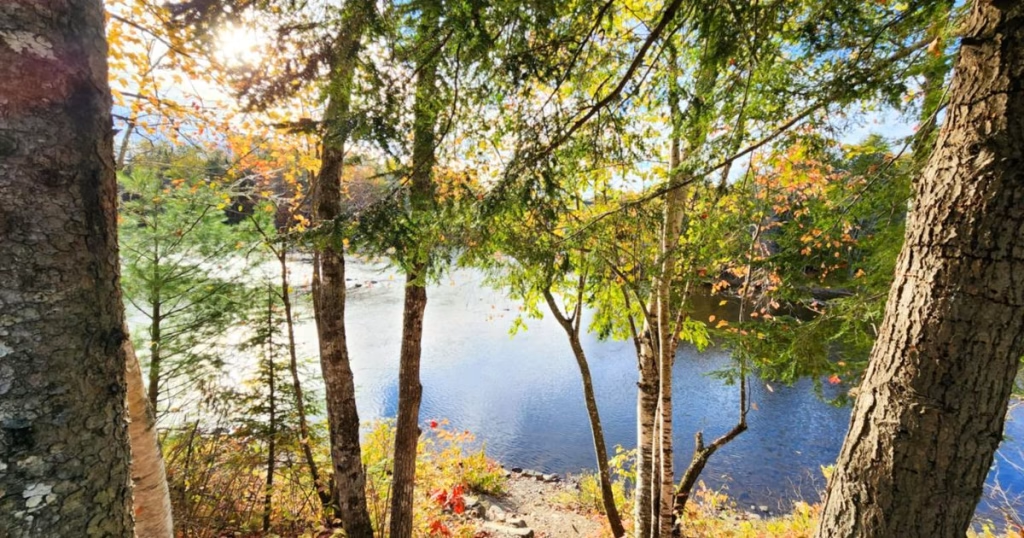
The truth is, humans weren’t designed to spend their days indoors — sitting at desks, staring at screens, or living inside perfectly climate-controlled spaces. For most of history, we lived in nature, not just near it. We walked through forests, gathered food, braved cold winds and hot sun, listened to the weather, and moved with the seasons. Our bodies and nervous systems were shaped by those rhythms.
Modern life might feel safer, cleaner, and more convenient, but all that comfort comes with a cost. When we spend nearly all our time indoors, overstimulated by noise and screens yet disconnected from the natural world, our mental health feels it. There’s a part of us that’s still wild and it simply needs to be outdoors in nature. And when we ignore that part, it’s no wonder we feel anxious, stressed, or depressed.
What I like To Do When Life Feels Too Much
There’s one thing that almost always pulls me back to myself: nature.
Not just stepping into my backyard — though that helps — but truly rewilding myself. Packing the kids and the dog into the car, driving to a trail where the trees close in and the world gets quieter. Our favorite spot is a short walk through the woods that opens onto a riverbank. The moment the forest surrounds us, I feel something in my chest unclench.
The kids run ahead, spotting birds and pretending there might be bears (there never are!). By the time we sit with our feet near the water and they toss rocks and play, something in me lightens. It feels like the tension I carried in is being washed downstream.
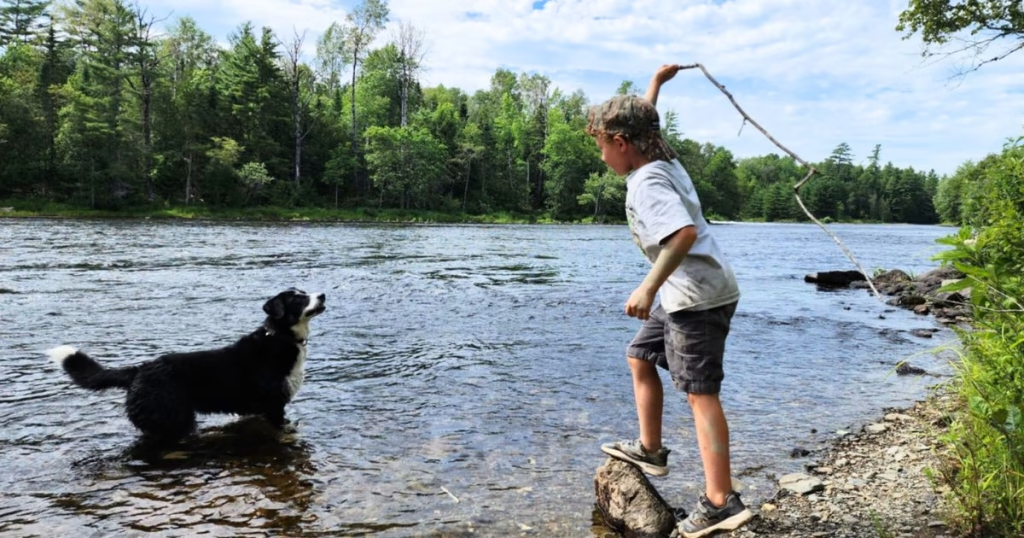
When we head back, with tired legs, muddy shoes, and happy faces, I like to reflect on how deeply nature can reset me. My mind feels clearer, my heart steadier, my spirit lighter.
That’s what inspired this post. I want other people, other moms, to feel this too.
Research actually supports this: even 10 minutes in nature can significantly reduce stress, improve mood, and lower anxiety (University of Michigan, 2019; Stanford University, 2015).
So whether you’re walking through something hard, feeling anxious or low, or simply having one of those days, nature might not fix everything, but it will help your nervous system reset. And sometimes, that tiny shift is enough.
And if you have kids? Let them be wild. Let them run, climb, get dirty, and breathe fresh air. Research shows that outdoor play reduces stress hormones, improves attention, and even decreases aggression in children (Cornell University, 2003; Frontiers in Psychology, 2019).
So let’s dive in and see seven reasons why nature can have such a positive impact of your mental health.
1. Nature is Perfect
This is a big one for me. Especially if you’re a mom, you know how overstimulating being home can be! There’s always something needing your attention — laundry, dirty floors, cluttered closets. Sometimes it’s hard to relax and feel present until everything is done (and do we ever finish?).
Decluttering, having good systems in place, or leaving the house for a few hours help. But going out in nature takes it to a deeper level.
Why? Because nature is simply perfect the way it is. You don’t look at falling leaves as a mess you need to clean up. You don’t see sand on the beach as something to sweep. Nature doesn’t need you — you can just be there.

Studies show that even short exposure to natural environments reduces cortisol (your stress hormone) and quiets the brain’s stress-response centers (Urban Forestry & Urban Greening, 2021; Complement Ther Med. 2020).
How to implement this:
When you go out in nature, leave your thoughts behind and focus on the present. No technology, no chores, no to-do lists — just you and the natural world.
2. Nature is Beautiful
Studies show that looking at beautiful things — anything our brain perceives as visually pleasing — boosts mood, reduces stress, and improves cognitive function. This includes art, babies, pets, and of course, nature (Int J Environ Res Public Health, 2021).
Whether it’s a breathtaking sunset, a majestic forest, or a tiny wildflower, beauty in nature has a measurable effect on emotional health.

How to implement this:
Visit a favorite nature spot — a beach, a river, a hill, a forest, or even a quiet park. Notice the big and small beauties around you. Let them brighten your day.
3. Nature is Fresh
Nature is never static, it always changes. Even the same trail, riverbank, or forest feels different from one visit to the next. The leaves shift with the seasons; the light changes, the air smells different; the colors, the texture under your feet, the sounds: everything dances with change.
That constant transformation offers a powerful psychological reset. Each time you step outside, you give your brain a chance to refresh, to see something new, to be reminded that life moves forward.

Psychological studies found that novelty and change stimulate the brain’s “reward” system, helping break patterns of rumination, renew creativity, and lift mood (NeuroImage, 2007). Even a familiar place can feel like a brand-new refuge when viewed through changing seasons or after a rain.
How to implement this:
Explore new natural places or keep revisiting favorite spots and notice how they change. Maybe it’s the first buds in spring, or the orange glow of fall leaves, the rush of rain, or the hush of snow. Let the change shift your perspective and refresh your spirit.
4. Nature’s Sounds Feel Quiet
Noise is one of my biggest triggers. Busy malls, traffic, even just indoor chaos can make my body tense up and my anxiety spike.
But nature’s sounds don’t overwhelm me. Waves, waterfalls, wind — none of it feels “loud” the way artificial and indoor sounds do.
Science backs this: nature sounds reduce sympathetic nervous system activity (the fight-or-flight system) and improve relaxation, focus, and emotional regulation (Int J Environ Res Public Health, 2019).
How to implement this:
Walk somewhere away from crowds and cars. Listen to the birds, the wind, your breath, your footsteps. Notice how these sounds feel grounding rather than overwhelming.
5. Nature can be grounding
Grounding (walking barefoot or touching natural surfaces) has been shown to reduce cortisol, improve sleep, decrease inflammation, and support emotional regulation (source).
Whether it’s grass, sand, mud, or water, connecting to the earth can calm the nervous system.
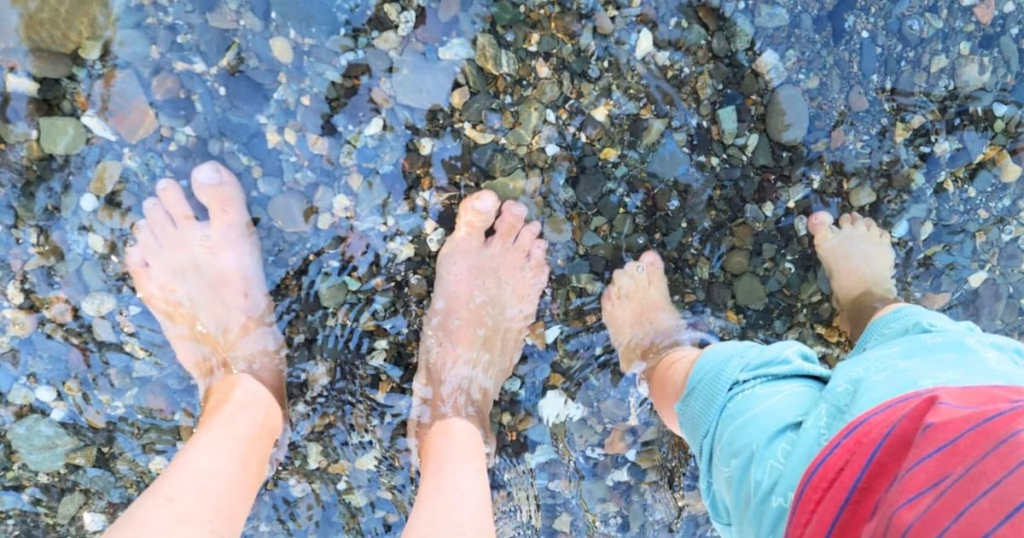
How to implement this:
Take off your shoes when it’s safe and comfortable. Stand, walk, or place your hands on the ground. In winter, you can briefly touch the snow or a tree with bare hands.
6. Nature Can Be Adventurous
If you haven’t been feeling great about yourself, try adding a little adventure.
Studies show that outdoor adventure activities trigger endorphins, improve attention, boost self-esteem, and build resilience (Forests, 2022).
Adventure doesn’t have to be extreme, just enough to push yourself out of your comfort zone.
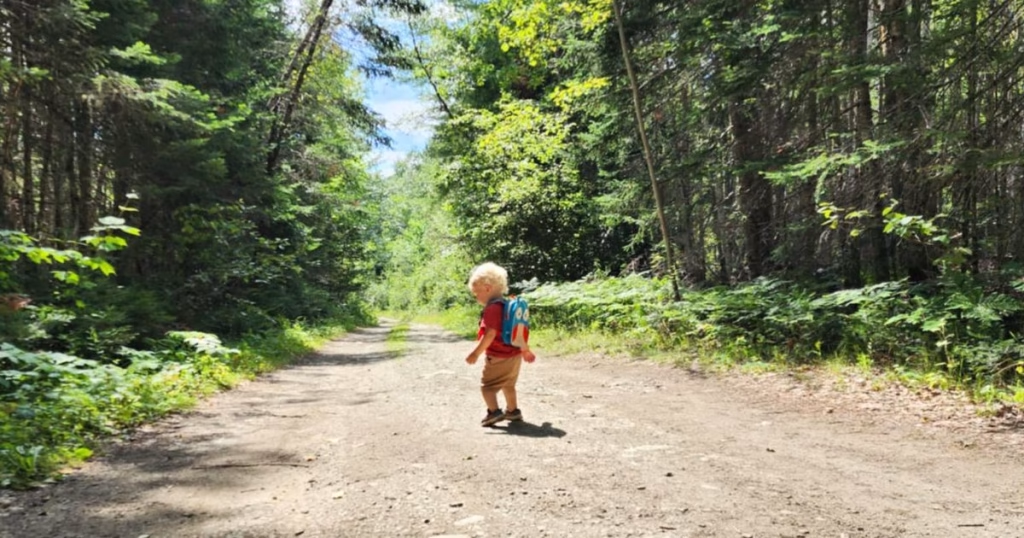
How to implement this:
Hike a new trail, climb a rock, dip in cold water, or bike on uneven terrain. Even a short challenge can remind you how strong and alive you are.
7. Nature Can Be Uncomfortable
This might sound strange, but discomfort can make you feel better. This is called hormesis — small doses of stress (like cold, heat, or physical exertion) stimulate beneficial adaptive responses in the body and could even increase lifespan (Ageing Research Reviews, 2024).
For example, cold exposure and challenging weather have been shown to increase resilience, enhance focus, improve mood, and help regulate the nervous system.
How to implement this:
Don’t wait for perfect weather. As long as you’re dressed safely, cold, rain, wind, or heat can be invigorating and therapeutic. Let the cold breeze hit your face or the rain soak your body to feel invigorated.
How to Let Nature Help You
Letting nature support your mental and emotional well-being doesn’t require perfection or hours of free time, rather just small, intentional moments. Go alone or bring your family, your friends, or pets. You don’t even have to go far. We are lucky enough to be only minutes away from remote, wild places, but if wilderness isn’t accessible, choose a quiet park.
Rewild yourself by walking a trail, sitting by a river, or wandering through the woods for even just 10–20 minutes. Let the forest wrap around you.
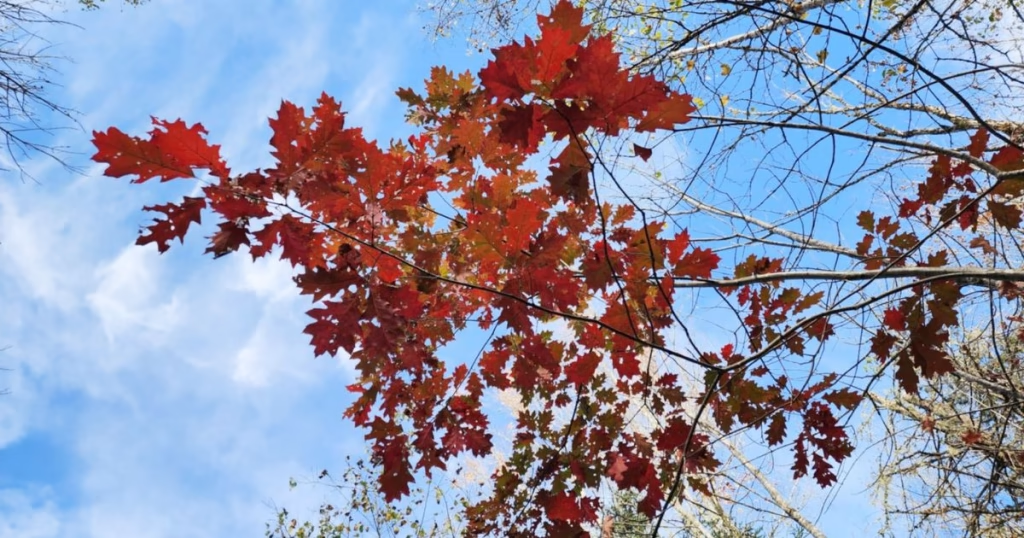
Turn your phone off unless you need it for safety. Ground yourself by going barefoot when you can. Listen to birds, leaves, water, and wind. Challenge yourself just a little by exploring uneven paths or climbing a rock.
And don’t shy away from imperfect weather. A little discomfort can build strength, resilience, and calm.
These small choices open the door for nature to steady you, restore you, and bring you back to yourself.
A final note of encouragement
Getting outside doesn’t magically fix everything. My messy house, my to-do list, my worries, they’re all still there when I come home. But nature gives me something precious: a reset. A reminder that I belong to something bigger than my daily stress. A space to breathe, reflect, and feel more like myself.
I want that for you too.
If you’re feeling overwhelmed — by motherhood, anxiety, work, or just the weight of it all — try stepping into nature, even for a few minutes. Not as a cure-all, but as a gentle balm. Let the wind touch you. Let the earth be your anchor. Let your spirit rest in the quiet and powerful sounds of the wild.
If you already love nature’s calming effects, I’d love to hear your experience. Share your favorite thing to do outside when you need a mental break. If you’re just beginning, welcome — I hope this inspires you.
Pin It For Later
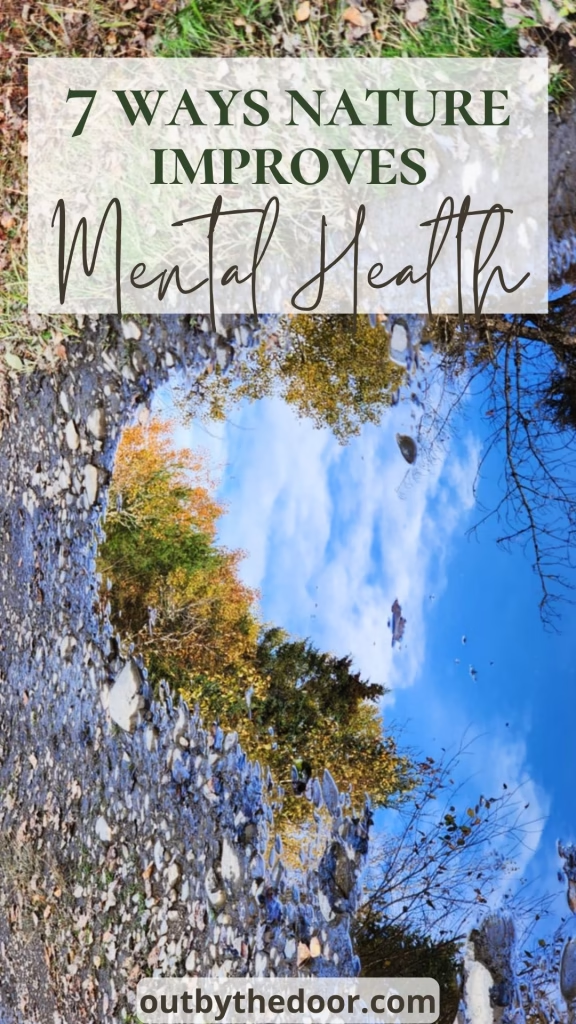
Related Posts and More On Healthy Living
Health Benefits of Spending Time Outdoors
10 (Fun) Ways to Exercise More Without Working Out
Morning Sunlight Benefits: Circadian Rhythms, Mood, and More
5 Steps to Improve your Health and Wellness (Holistic Health)
Why your Gut Health is Important and How to Improve it Naturally
The Benefits of Eating Collagen and Gelatin
The Benefits of a Grain-free Diet and What to Eat
Nose to Tail Eating: Benefits and Recipes
Organ Meats: List, Health Benefits, and Recipes
Nutrient dense animal foods for pregnancy
Disclaimer: This post shares my personal experiences and general information about the mental-health benefits of spending time in nature. It is not medical advice and should not replace guidance from a qualified healthcare professional. Everyone’s needs and circumstances are different — please talk to your doctor, therapist, or another trusted provider if you’re struggling with your mental health or have specific concerns. If you ever feel unsafe or in crisis, seek professional help right away.







Hey Marta! Thank you so much for the reminder! I need this especially now! I do know about the benefits of forest bathing or rewilding. But I tell myself I’m too busy right now and it’ll have to wait. I think that is exactly when I need it. I used to love hiking a trail in the mountains of NH after work several times a week, many years ago when I lived in the White Mountains. And I would encounter all sorts of wild critters. Moose a few times, and yes a black bear once. He came out of the brush right in front of me. That was making my heart stop for a second. I was deep in the woods, an hour from my car and even more from civilization. But thankfully the bear ran off once he or she saw me. Phew! I had pepper spray, but it was in my backpack. After that encounter it moved into my coat pocket on all future hikes, lol. I do love a good adventure!
I love this post! I notice a big difference when I have been outside in nature versus when I’m not. So much happier and relaxed when I am!
This is the most I have enjoyed reading a blog post in a long time. This was incredibly beautiful and so well written. It made me feel calm just reading it!!! I loved this quote: “ Nature doesn’t need you — you can just be there.” How wonderful and freeing that concept was to me as I read about it! And this: “ But nature gives me something precious: a reset. A reminder that I belong to something bigger than my daily stress. A space to breathe, reflect, and feel more like myself.” wow. I could put that reminder in my planner. I am a homeschool mom of 7 and definitely need to work on my nervous system. I have had a tough last few weeks and the other day I pushed of homeschool to take a morning walk after breakfast with everyone. I somehow instinctively knew I needed to get out and breathe. But reading this makes it all make sense. A few paragraphs in I was already researching trails and parks nearby for our next walk or putting because we live in a new area. Thank you so much for this. Pinning too!